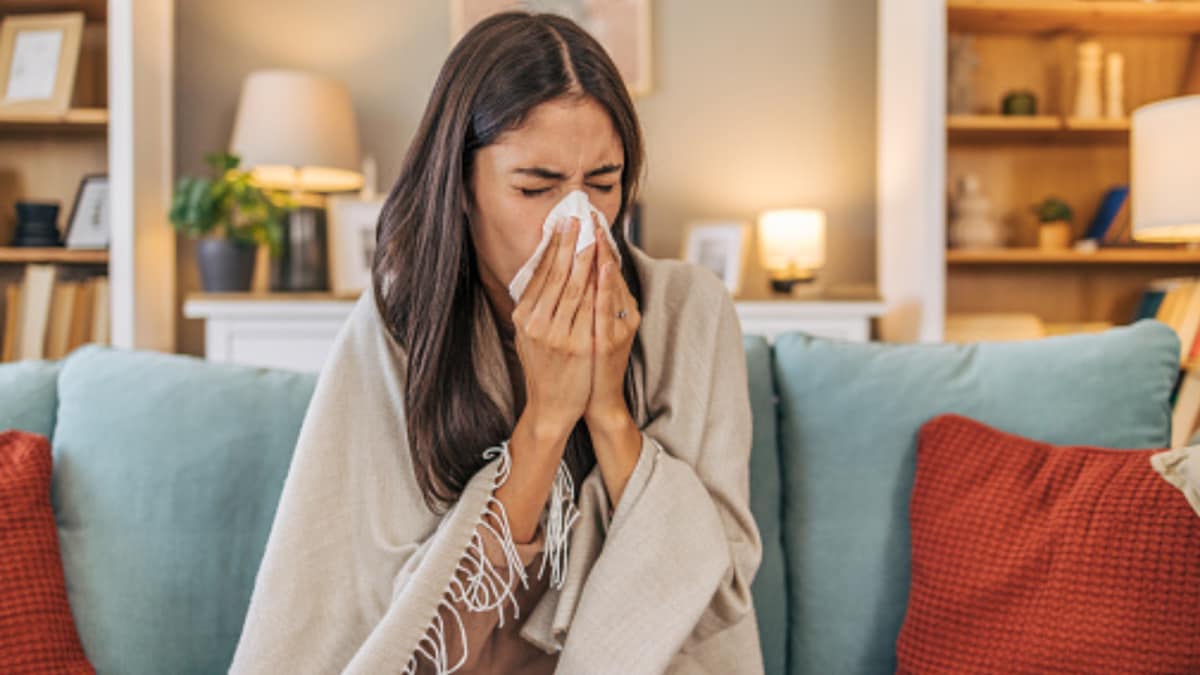Last Updated:
With Delhi and many other cities experiencing a sharp decline in air quality after Diwali, doctors are warning of an increase in allergies, asthma, and other respiratory problems.

Doctors recommend staying indoors during peak pollution hours.
As the festive lights fade and winter sets in, a familiar haze returns to the skies – thick with pollutants, allergens, and respiratory irritants. With Delhi and many northern cities witnessing a sharp dip in air quality after Diwali, doctors are warning of a seasonal surge in allergies, asthma, and respiratory issues. Children, the elderly, and those with pre-existing conditions are especially vulnerable as the Air Quality Index (AQI) worsens across regions.
Why Winter Triggers Allergies and Breathing Issues
According to Dr. Hinal Shah, Consultant Biochemist at Agilus Diagnostics, the physics of winter itself contributes to respiratory distress. “As air density increases during colder months, pollutant particles become stagnant and move slowly. This irritates the respiratory tract, especially in people prone to allergic rhinitis, asthma, or eczema,” she explains. Sneezing, coughing, congestion, and wheezing are some of the most common symptoms.
Dr. Shah recommends minimising exposure by staying indoors during peak pollution hours – usually early mornings and late evenings – and using N95 masks and air purifiers with HEPA filters when stepping outside. “Regularly cleaning AC vents and keeping windows closed on high AQI days can reduce irritation and hyperstimulation,” she adds.
How To Keep Indoor Air Safe
Dr. Ravi Shekhar Jha, Director & HOD – Pulmonology & Sleep Medicine, Fortis Escorts Faridabad, emphasises the importance of managing indoor environments. “Since people spend most of their time indoors, indoor air quality matters a lot. Using HEPA air purifiers and keeping humidity around 30–50% can significantly reduce allergens,” he says.
He also recommends keeping windows shut when AQI levels spike and avoiding strenuous outdoor activity near traffic zones. “When pollution is high, it’s better to exercise indoors, stay hydrated, and use nasal saline rinses to flush out particles,” he advises.
Maintaining cleanliness can also make a big difference. Regular vacuuming with HEPA filters, mopping floors, and dusting surfaces helps minimise allergens like pet dander and mould. For those with chronic allergies or asthma, Dr. Jha suggests working with a doctor to establish a preventive medication plan and to always keep inhalers handy.
Children Are Especially At Risk
The youngest lungs suffer the most. Dr. Medha, paediatrician at Madhukar Rainbow Children’s Hospital, warns, “The current air pollution levels in Delhi have become a serious health risk for children. Their immune systems make them more vulnerable to the harmful effects of polluted air.”
Long-term exposure, she cautions, can impair lung function and even affect concentration and school performance. To mitigate the risks, she advises parents to avoid outdoor play during peak pollution hours, use air purifiers at home, and ensure children wear proper masks when outside.
Experts agree that while personal precautions like using purifiers, wearing masks, and staying indoors are essential, collective action is equally critical. Reducing vehicular emissions, promoting green transport, and supporting clean air initiatives can help reverse the seasonal smog pattern.
Delhi, India, India
October 26, 2025, 16:34 IST






